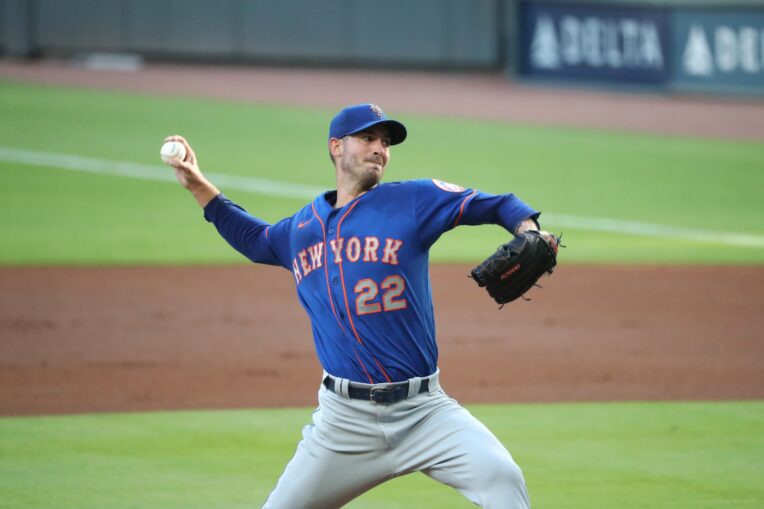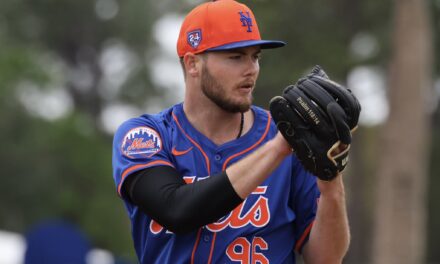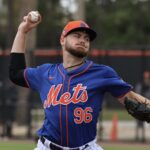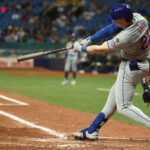
The New York Mets will have a decision to make in regards to their rotation going forward once Marcus Stroman returns from the injured list.
As mentioned by Anthony DiComo of MLB.com, Stroman threw a simulated game on Thursday after having previously thrown one on July 31. Stroman’s rehab is trending in the right direction and he is on pace to return soon if all continues to go well. Regardless of when that actually is, the Mets will have to decide who among David Peterson, Rick Porcello and Michael Wacha is the odd man out of the rotation if they continue to roll with a five-man rotation.
Peterson may end up being the odd man out since he is a rookie who did not factor into the Mets’ plans this season until the beginning of last week. Despite his lack of seniority, Peterson should not be the odd man out.
Peterson has pitched well through his first two starts and in regards to value, his bWAR (0.3) and fWAR (0.3) currently ranks second best in the rotation behind Jacob deGrom‘s bWAR (0.6) and fWAR (0.7) with one more start behind his belt.
Even if Peterson ends up stumbling in his next start or two, he is likely to be more of a factor than Stroman, Porcello and Wacha next year and in the years to come, since all three of them are free agents at the end of the year and thus are not guaranteed to return.
Therefore giving Peterson a shot to prove whether or not he can pitch well in the majors would be more in the Mets’ favor than giving Porcello or Wacha a shot to prove that they can once again pitch at the top of their games. If he continues to pitch like he has so far, that helps the Mets both in the present and the future.
If the Mets do indeed make the decision to keep Peterson in the rotation, the question then becomes who between Porcello and Wacha should stay?
Porcello has made two bad starts and one good start this season. In his first two starts against the Atlanta Braves, Porcello allowed a combined 11 runs (nine earned), 12 hits and six walks in six innings. However, on Wednesday Porcello spun a gem as he went seven innings of one-run ball in which he efficiently limited the Washington Nationals to five hits and no walks on 81 pitches.
On the other hand there is Wacha who has only pitched twice so far and has had a good start (in which he limited the Boston Red Sox to one run, five hits and one walk in five innings pitched) and a bad start (in which he allowed the Braves to produce five runs, seven hits and two walks in four innings pitched).
Recency bias would lead someone to choose Porcello, unless of course Wacha pitches a gem against the Miami Marlins in Friday night’s game.

In the end Porcello should get the chance to stay in the rotation, and the small sample size we have seen is not the sole determining factor for that reasoning.
Porcello pitches to contact and thus his success is much more dependent on the defense than a strikeout pitcher like deGrom. The Mets’ defense has not been anything to write home about for years now, and that played a negative factor in Porcello’s first two starts. Despite an overall 6.92 ERA, his FIP is 2.83, proving his results would have been better had his defense provided more support.
During Porcello’s start on Wednesday, injuries led the Mets to field a different team than normal. With Andres Gimenez at shortstop, Luis Guillorme at second base, Billy Hamilton in center and Brandon Nimmo moved over to left field, it was one of the best defensive teams the Mets have fielded in recent years. That was proven time and time again throughout the game as solid defensive plays were made by a variety of players.
The @Mets flashing some leather on #MLBNShowcase! pic.twitter.com/NQsLWtZX4J
— MLB Network (@MLBNetwork) August 5, 2020
While the level of defensive play seen on Wednesday may be difficult to replicate in the future, there is no doubt that that was a defense-first lineup which the Mets would be wise to use in future starts by heavy contact pitchers like Porcello. While it will not always lead to an effortless seven innings of one-run ball, it will definitely help bring his ERA closer to his FIP and thus justify his presence in the rotation.
Wacha, like Porcello, also pitches to contact. If the Mets field similar defenses to the one during Wednesday’s game, Wacha should benefit as well. However, through his first two starts, Wacha still has a 5.21 FIP to go along with his 6.00 ERA. That is mostly due to the fact he has allowed two home runs in his nine innings pitched so far. Porcello on the other hand has yet to allow a home run in 13 innings.
In Wacha’s first six seasons, he never had a HR/9 over 1.0, but last year had 1.8 HR/9 which is a startling increase. His early trouble with the long ball this year begs the question of whether or not that will continue to be a lingering issue for him this season. If so, it would be problematic as last year was arguably Wacha’s second worst season.
Coming into the season, Porcello was ahead of Wacha in their respective rotational standings. Porcello’s struggles in his first two starts were problematic, but his most recent start was not only good, but potentially sustainable if the Mets continue to prioritize fielding a better defense behind him. While Wacha may have a chance in his upcoming start to prove that a better defense can also help him, he will also need to limit the long ball in order to make a case for himself.
Unless Wacha really stands out in his next start or two, he will be the odd man out of the two pitchers. Even being close to Porcello in production will make him the odd man out.
In the end it will be the Mets’ choice of whether they want to ride with the rookie and move the less productive of those two veterans, or go the seniority route regardless of production and the future of the rotation.















